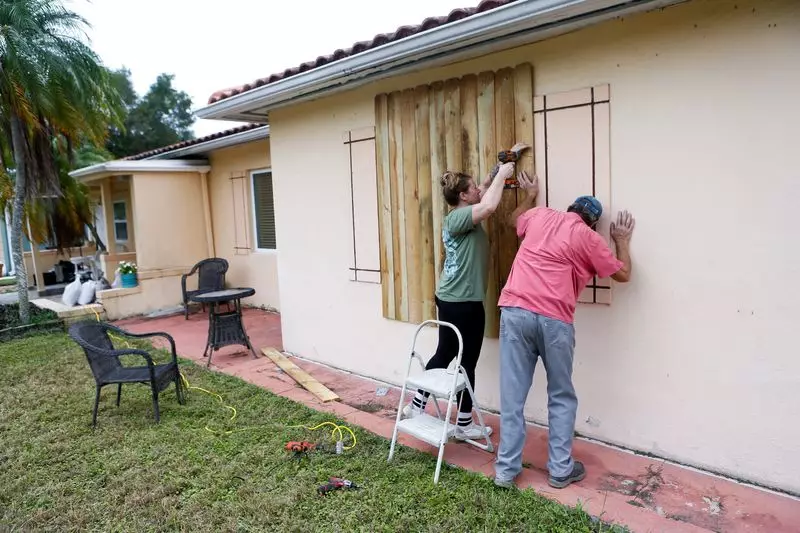As Hurricane Milton approaches the Florida coast, there’s an unsettling specter looming over the already troubled property insurance market of the state. This formidable storm, poised to wreak havoc on a region known for its perilous climate conditions, not only threatens to escalate the already sky-high insurance costs but also places countless residents at risk of inadequate coverage. According to expert assessments, the hurricane could produce between $60 billion and $100 billion in insured damages, intensifying an existing insurance crisis that has seen major insurers retreat and leave Florida homeowners at the mercy of underfunded options.
Hurricane Milton has been classified as a “catastrophic” major hurricane with wind gusts recorded at a staggering 160 mph (260 kph). Its projected landfall near the Tampa Bay area, home to millions, underscores the urgent need for immediate preparedness. The specter of devastation echoes past disasters, such as Hurricane Katrina in 2005, which caused $100 billion in damages. Yet, this forecast of impending catastrophe does not merely serve as a warning for physical destruction; it highlights a systemic failure within the state’s insurance framework, where policyholders are increasingly left scrambling for adequate protection as traditional commercial insurers continue their mass exodus.
The intricate web of the property insurance market in Florida is characterized by a chilling reality: national insurers are opting out, and thus leaving vulnerable residents to navigate a perilous landscape marked by scant options. This scenario is compounded by the burgeoning threat of claims rejection. Research from Weiss Ratings indicates that, shockingly, six of the leading insurers in Florida denied approximately half of their claims in the current year. This atmosphere of denial further complicates the precarious situation, where residents viewing insurance as a safety net find themselves in a trap of vulnerability instead.
Further complicating the dynamics of the insurance crisis is the emergence of Citizens Property Insurance Corporation—a state-run nonprofit designed to cover those unable to find coverage in the dwindling private market. Although designed as a safety valve, the financial mechanisms behind Citizens are concerning. If the organization runs low on funds, it possesses the authority to pass excess costs onto all insured Floridians, exacerbating a precarious financial climate.
Several interrelated factors are contributing to this dire state of affairs, including the increasing frequency of extreme weather patterns, inflation, and the enduring implications of climate change. These elements form a perfect storm for an insurance market already hanging by a thread. Florida, despite its geographical vulnerabilities, has witnessed a consistently growing population, which heightens demand for housing amidst declining availability due to rising sea levels and severe weather risks.
With 78 out of the 80 riskiest ZIP codes in the U.S. situated in Florida, according to Weather Source, the state’s perfect blend of weather-related risks and unprecedented demand presents both a challenge and an opportunity for insurance providers. However, many have chosen risk avoidance over engagement, transferring potential liability to smaller, less resourceful entities. Shockingly, since 2003, 41 insurers in Florida have declared bankruptcy, marking a severe deviation from national trends.
The implications of this crisis are profound, particularly for homeowners who feel the pressures of exorbitant premium increases. With average costs nearing $4,060 in 2022—significantly higher than any other state—many residents are forced to reassess their coverage options. This often results in scaling back necessary insurance or, in some cases, foregoing it altogether. Alarmingly, a report by the Consumer Federation of America notes that one in thirteen homeowners across the United States lacks insurance—a statistic that disproportionately affects marginalized groups.
As state officials tout recent legal reforms designed to curb the explosion of unwarranted lawsuits, the anticipated stability these changes bring remains murky. With some private insurers cautiously re-entering the Florida market, the potential for a damaging storm like Hurricane Milton to dismantle these fragile gains looms ominously.
As Floridians brace for Hurricane Milton, the urgent need for strategic reforms within the property insurance sector becomes increasingly evident. Addressing the complexities of Florida’s insurance crisis requires a collaborative effort involving policymakers, insurance companies, and homeowners. This coordination is essential for developing sustainable solutions that not only provide adequate coverage but also empower residents amidst an ever-changing climate landscape. As the storm approaches, the real question remains: Will the reputation of Florida as a desirable destination withstand the pressures of escalating natural disasters and a precarious economy? Only time will tell.

